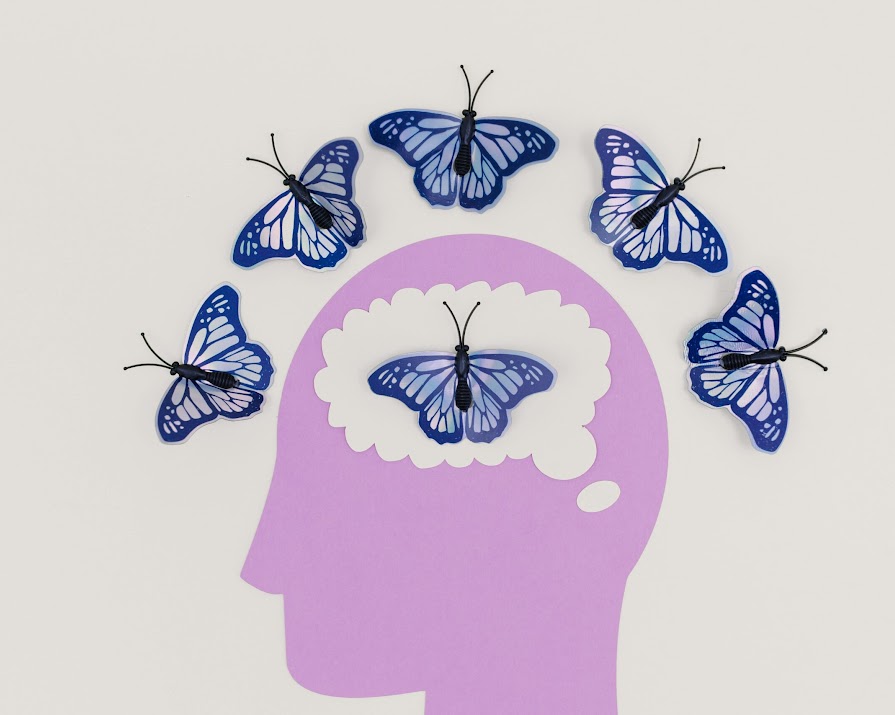
Sponsored
What exactly is the brain-gut connection and how can I improve mine?
Sponsored By

By Shayna Sappington
26th Jun 2024
26th Jun 2024
Sponsored By

Ever wondered where the term ‘gut feeling’ comes from? We sit down with Dr Lisa Harpur, clinical psychologist and founder of Gut Feelings Therapy, to find out more about our mind-body connection and how we can tune into it.
“Let’s start simply: I think most of us are intuitively aware there is a connection between our mind and body,” explains Dr Lisa Harpur. “For example, we have all experienced ‘butterflies’ in our stomach when nervous or excited, and the change in bowel symptoms when anxious. Even our language captures this knowledge – ‘my stomach sank when I heard the bad news’ or ‘it was a gut-wrenching experience’. We intuitively know that our emotional states usually manifest within our body as well as our mind.
“What’s more complicated is understanding how this connection works, and to what extent our mind and body influence each other.”
Understanding the “how” of this connection is Dr Lisa Harpur’s speciality. As a Senior Clinical Psychologist, her work days are split between her full-time job in public healthcare, specifically in gastroenterology, and her own private practice Gut Feelings Therapy.
“I support patients whose mental health seems to impact their physical symptoms, those living with the psychological burden of chronic conditions such as Crohn’s disease and Ulcerative Colitis, and those with medically unexplained physical symptoms – as well as those experiencing general psychological and relational difficulties.”

Dr Harpur’s expertise lies in understanding “how our minds and bodies are connected, the ways in which psychological or emotional phenomena can impact us physically, and how so-called ‘functional’ symptoms can come to be”. Her passion for these topics led her to establish Gut Feelings Therapy, a unique psychological practice that approaches health holistically.
“There is so much emerging evidence about the interconnectedness of mind and body, and the impact that emotional states, psychological processes and mental health problems can have on our physical well-being and physiological functioning. For me, it is essential to address psychological problems from the top down and the bottom up—both mind and body.”
So, how exactly does this mind-body connection work and how do you know if you’re out of sync? Let’s dig in…

How intertwined are our mental and physical health?
“This is such a huge and complex area. We are only beginning to understand it, really. What we do know is that our autonomic nervous system is pivotal in this connection, relaying information between mind and body bi-directionally. This can be best demonstrated by how anxiety works. Our mind senses some sort of ‘threat’, be it physical, emotional or social, and triggers the ‘fight-or-flight’ response. This stress response produces a cascade of stress hormones and activates our autonomic nervous system, resulting in increased heart rate and breathing, sweating, changes in digestive activity, shaking etc. Lots of physical symptoms are caused by the mind’s interpretation of danger.
“This is fine in the short term; it is designed to get us out of harm’s way and then switch off. However, if the ‘threat’ doesn’t subside, or if we have a worry-prone mind that keeps finding things to fret about, the stress response will keep going and result in Chronic anxiety or stress. That means chronic secretion of stress hormones, chronically elevated blood pressure and a weakened immune system. Think about all those colds and cases of flu after exam season!”
Can you explain the concept of the gut-brain connection and how it works?
“Again, our understanding of this complex connection is still in its infancy. As I’ve discussed, the mind and body are connected, largely via the workings of the autonomic nervous system. This connection is particularly strong between the brain and the gut; a large branch of the ANS called the enteric nervous system runs all through the lining of the digestive system, from the oesophagus to the rectum. The ENS is the most complex neural network outside of your brain and has some degree of independent functioning. This has led the ENS to be dubbed ‘the second brain’.
“The ENS relays information from our gut to our brain and vice versa via the vagus nerve. This “superhighway” sends constant information about goings on at either end. In this way, the gut can have a direct impact on our brain and emotions, and our brain and emotions can directly affect our gut. The exact mechanisms are complex, but essentially this means that a distressed brain can impact gut functioning, and a distressed gut can impact the brain. As such, it is believed that gastrointestinal (GI) problems may influence the development of emotional problems, and emotional problems may trigger GI problems. That is particularly the case where people present with GI issues in the absence of an organic cause—so-called ‘functional’ disorders. Psychological factors seem to play a significant role in these presentations.”
You specialise in disorders of gut-brain interaction like IBS. Can these be impacted by our mental health? How so?
“They can. Irritable Bowel Syndrome (IBS) is a condition in which people experience a range of gastrointestinal symptoms without anything being physically wrong with their bowels; the symptoms aren’t caused by a disease process, but rather by the bowels not functioning as they should. A number of factors may contribute to this disruption, including genetics, the gut microbiome, gut sensitivity, and difficulty digesting certain foods. Psychological factors also seem to contribute, and indeed many sufferers link heightened stress/anxiety to the worsening of their symptoms. While emotional factors are not directly responsible for causing IBS in the first instance, it is generally accepted that they play a significant role in triggering IBS symptoms.”

“Brain-gut communication is central to understanding how mental health impacts IBS. As already explored, the gut and brain are very closely connected and communicate with each other directly. In IBS, emotional signals sent from the brain can trigger a stress response in the gut. This is similar to how the fight-or-flight response impacts the digestive system. It can result in food moving more quickly or slowly through the digestive tract, episodes of urgency and diarrhoea, increased pain perception, and feeling bloated. It is suggested that the more stress messages the gut receives from the brain, the more sensitive the gut may become over time. This means the gut might be triggered more easily and by smaller stressors. It may even become sensitive to the sensations of its own digestive processes. It is unclear why IBS occurs for some people and not others, but it does seem to impact a significant amount of the population—about 15%.”
What does the latest research on the gut-brain connection tell us?
“There is lots of interesting research emerging on how the gut-brain connection works, specifically the mechanisms of action. I find the research about the gut microbiome, which I alluded to above, to be particularly fascinating. We are gradually learning more about how the microbiome—trillions of bacteria in the digestive system—influences the workings of the brain, immune system, and endocrine system. Research suggests that when the microbiome gets out of whack—which can happen fairly easily depending on diet, medications, lifestyle factors etc—it can reduce the production of important neurotransmitters such as serotonin and dopamine. This has important implications for mental healthcare; serotonin is the ‘feel good’ hormone, while dopamine is linked to motivation, excitement and pleasure. Deficiencies in these hormones have been linked to mental health problems. This really emphasises again the need to consider the whole person in mental health treatments.”
What is the science behind the phrase “gut instinct”? How reliable is it?
“When we talk about ‘gut feelings’, we are generally referring to the idea of intuition. A term that is growing in popularity to describe this concept is ‘neuroception’. It was coined by Dr Stephen Porges, psychologist and neuroscientist, as a potentially plausible way to understand how ‘intuition’ works.
“Neuroception means detection without awareness; taking in information and developing a ‘feeling’ about something without the thinking parts of your brain being involved. Dr Porges suggests that it is a fairly primitive, subcortical process that enables animals—humans included—to quickly and unconsciously detect signs of safety or danger in social contexts without needing to consciously process the situation first (this would take longer). He suggests that this enables us to navigate the world skilfully and safely; if we can unconsciously detect subtle signs of danger or safety from another person’s demeanour or the environment, we can know whether to approach, avoid, or remain guarded. He suggests that neuroception also allows us to read the emotional temperature of a room and pick up on people’s hidden emotions.
“This seems to gel with research in other areas reporting that a large percentage of what we communicate when interacting with others is non-verbal—i.e. based on tone of voice, eye contact, facial expression, body language. This is how we know someone isn’t really OK, despite them saying ‘I’m grand!’. Neuroception is a theory. It is not yet widely accepted, so I would be cautious about the science behind it. However, it does offer a seemingly plausible explanation for our experiences of ‘getting a bad feeling’ about something, or ‘knowing in your gut’ that something is the right choice.”
In celebration of World Microbiome Day on June 27, Meaghers Pharmacy have 20% off all Symprove products, so you can help reset your gut and prioritise your health and wellness this summer.
Delivering expert advice in a friendly and professional way, Meaghers Pharmacy have redefined the role of the pharmacist in the communities they serve and offer accessible and affordable healthcare solutions to patients in need of expert advice. Use the code IMAGE15 for 15% off all full-price products on their website.























